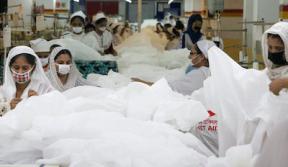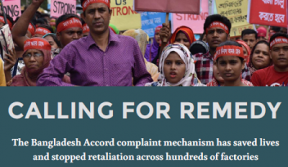As people arrived for The Children’s Place’s annual shareholder meeting this morning, they were greeted with a sobering reminder of the death toll resulting from the company’s failure to properly monitor its supply chain. Members of 99 Pickets, International Labor Rights Forum, and United Students Against Sweatshops lay wrapped in white sheets in the lobby of the company’s headquarters in Secaucus, New Jersey. Other protestors chanted “Mothers, sisters, daughters, wives… what’s the discount on their lives?” and requested a meeting with CEO Jane Elfers to ask why The Children's Place has paid such a minimal amount into the Rana Plaza victim compensation fund. Photos displayed next to the protesters depicted the struggle of survivors and families in aftermath of the Rana Plaza building collapse of April 24, 2013, which killed at least 1,138 workers and injured 2,500. New Wave Style, one of the five factories housed at Rana Plaza, made clothes for The Children’s Place and Walmart. The die-in today called on The Children’s Place to pay full and fair compensation to the injured workers and families of the deceased, the same message urged in protests in Bangladesh and in online actions. Like Walmart, The Children's Place is refusing to pay more than a fraction of what they’ve been asked to contribute.
Yesterday survivors and children who lost their parents demonstrated at the Rana Plaza site, calling on The Children's Place and Walmart to pay full and fair compensation to the victims of their lethal negligence. An online petition addressed to the companies by Rana Plaza survivor Aklima Khanam, who recently protested at The Children’s Place headquarters, now has over 104,000 signers. To date the two companies have paid less than six percent of the amount activists are calling for and have refused to sign the Accord on Fire and Building Safety in Bangladesh, a legally-binding agreement between 175 companies and a dozen unions for independent inspections of nearly 2,000 factories and mandatory company-financed renovations to make the factories safe.
“On the morning of April 24th, the management forced us into the factory using physical violence and said that there was a shipment of 24,000 pieces that needed to go out. They said we would be fired and not paid if we couldn't meet the target,” said Khanam. “Now I stay at home. I’m ill a lot of the time so I can’t do much. If the brands don’t pay compensation, it will be really difficult to get by.”
“Many of the survivors can’t access necessary medical care because they don’t have money to pay. Families are starving because they don’t have money for food. Some workers have had to pull their kids out of school,” said Kalpona Akter, Executive Director of the Bangladesh Center for Worker Solidarity. “This is why we’re campaigning for companies to pay full and fair compensation.”
Nearly a year after the building collapse, The Children’s Place gave $450,000 to the Rana Plaza Donors Trust Fund, the victims’ compensation fund under the Rana Plaza Arrangement, which is facilitated by the International Labour Organization.
“The International Labor Rights Forum and allies are urging The Children’s Place to pay a total of $8 million to the Rana Plaza Donors Trust Fund, said Judy Gearhart, Executive Director of the International Labor Rights Forum, who participated in the die-in this morning. “The Children’s Place reported $655.5 million in gross profit in 2013 and its CEO’s compensation in 2012 was $17 million. Clearly the company can afford to pay more than a paltry $200 per family. After all, we’re talking about the deadliest disaster in the history of the global garment industry.” Companies of similar size, such as Joe Fresh and Primark, have committed seven or fifteen fold the amount The Children's Place has paid.

